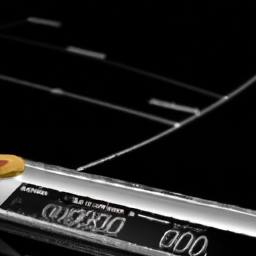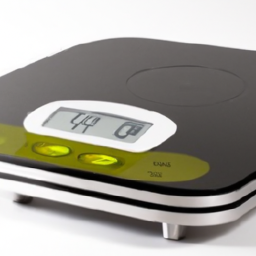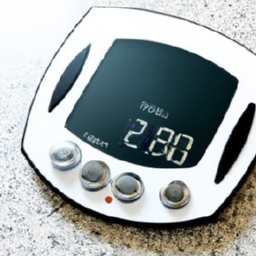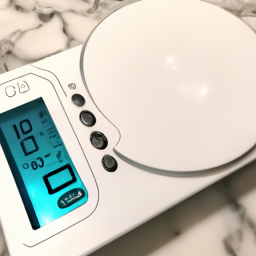How Does A Smart Kitchen Scale Work
In this article, you will discover the fascinating workings of a smart kitchen scale. By exploring the intricacies behind this innovative device, you will gain a deeper understanding of how it operates. From its advanced sensors to its seamless connectivity, a smart kitchen scale takes the guesswork out of cooking and baking, making it an indispensable tool in any modern kitchen. Prepare to be amazed as we unveil the inner workings of this intelligent kitchen companion.
Understanding the Basics of a Smart Kitchen Scale
Definition of a Smart Kitchen Scale
A smart kitchen scale, also known as a digital kitchen scale, is a modern kitchen gadget equipped with technology to accurately weigh ingredients and provide precise measurements. Unlike traditional kitchen scales that rely on a balance mechanism or mechanical springs, smart kitchen scales use digital sensors and microcontrollers to measure weight and display the results on a digital screen.
Brief History of Kitchen Scales
Kitchen scales have been used for centuries to ensure accurate measurements during cooking and baking. Early kitchen scales were primitive devices that used weights or a balance mechanism to determine the weight of ingredients. However, with advancements in technology, digital kitchen scales emerged in the late 20th century, providing more precise measurements and user-friendly features.
Differentiating Between Traditional and Smart Kitchen Scales
The main difference between traditional and smart kitchen scales lies in their underlying technology. Traditional scales rely on mechanical components and manual reading of weights, whereas smart kitchen scales use digital sensors, microcontrollers, and intuitive displays to provide accurate and convenient measurements. Smart kitchen scales also offer additional features such as connectivity options and integration with recipe apps.
Working Principle of a Smart Kitchen Scale
Role of Load Cells in Determining Weight
Load cells are the key components in smart kitchen scales that measure the weight of ingredients. These miniature transducers are designed to sense the applied force and convert it into an electrical signal. Load cells consist of strain gauges – thin metallic strips that change resistance when subjected to force. This change in resistance is then converted into a voltage signal and processed by the microcontroller.
Relevance of Strain Gauges
Strain gauges play a crucial role in converting the applied force into an electrical signal. These tiny devices are attached to the load cell and bend or stretch in response to the force exerted by the ingredients being weighed. As the strain gauges deform, their resistance changes proportionally, allowing the microcontroller to accurately determine the weight based on the voltage measurements.
The Conversion Process: From Physical Force to Digital Measurement
Once the load cells and strain gauges determine the weight, the microcontroller processes the electrical signal and converts it into a digital measurement. The microcontroller is programmed to perform this conversion by applying mathematical algorithms and calibrations specific to the smart kitchen scale. The digital measurement is then displayed on the screen, providing the user with an accurate weight reading.
The Technology behind a Smart Kitchen Scale
Understanding the Roles of Microcontrollers
Microcontrollers are the brains of smart kitchen scales. These integrated circuits are programmed to perform various functions, including data processing, conversion of signals, and output control. In a smart kitchen scale, the microcontroller processes the electrical signals from the load cells and strain gauges to determine the weight. It also manages the display unit, user interface, and connectivity options.
Explanation of Circuit Boards in Sensing Weight
Circuit boards, also known as PCBs (Printed Circuit Boards), are essential components of smart kitchen scales. These boards connect the microcontroller, load cells, and strain gauges, allowing the transfer of electrical signals. The circuit board ensures proper communication and coordination between these components, enabling accurate and reliable measurement of weight.
The Integral Role of Firmware
Firmware is the software embedded in the microcontroller of a smart kitchen scale. It provides the necessary instructions for the microcontroller to perform its functions accurately. The firmware governs the conversion process, calibration, and other functionalities of the scale. Manufacturers often release firmware updates to enhance the scale’s performance and add new capabilities.
Smart Kitchen Scales and Connectivity Options
Wi-Fi and Bluetooth Capabilities
Smart kitchen scales often come equipped with Wi-Fi or Bluetooth capabilities, allowing them to connect to other devices. With these connectivity options, users can wirelessly transmit weight measurements to their smartphones, tablets, or other compatible gadgets. This enables seamless integration with recipe apps, nutritional databases, and other digital platforms.
Syncing with Kitchen Gadgets
Smart kitchen scales can also synchronize with other kitchen gadgets, such as smart ovens or mixers. By connecting with these devices, the scale can accurately measure ingredients and automatically adjust cooking times or ingredient proportions. This integration streamlines the cooking process and ensures precise measurements for optimal results.
Integrating Smart Kitchen Scales with Phones and Tablets
One of the key advantages of smart kitchen scales is their ability to integrate with smartphones and tablets through dedicated apps. These apps often provide additional features, including recipe suggestions, nutritional information, and tracking of dietary goals. By connecting the scale to a mobile device, users can access a wealth of information and simplify their cooking experience.
Key Features of a Smart Kitchen Scale
Display Modes and Units of Measure
Smart kitchen scales offer various display modes and units of measure for user convenience. The digital screen can display weight measurements in grams, ounces, pounds, or kilograms, allowing users to choose their preferred unit. Additionally, some scales offer different display modes, such as a live graph of weight changes or a graphical representation of portion sizes.
Syncing with Food and Recipe Apps
Many smart kitchen scales have the capability to sync with food and recipe apps, providing users with a comprehensive cooking experience. These apps often offer a vast collection of recipes, step-by-step instructions, and even personalized recommendations based on dietary preferences. By syncing the scale with these apps, users can seamlessly follow recipes and ensure accurate ingredient measurements.
Potential for Real-Time Nutritional Analysis
Some advanced smart kitchen scales can provide real-time nutritional analysis of ingredients and recipes. By inputting ingredient details or scanning barcodes, the scale can calculate the nutritional content, including calories, macronutrients, and vitamins. This feature is particularly beneficial for individuals with specific dietary requirements or those aiming to maintain a healthy lifestyle.
Advantages of Using a Smart Kitchen Scale
Precision in Weighing and Portioning
One significant advantage of smart kitchen scales is their accuracy in weighing and portioning ingredients. The digital sensors and load cells provide precise measurements, ensuring consistent results in cooking and baking. Accurate ingredient proportions are crucial for recipe success and can significantly impact the taste and texture of the final dish.
Contribution to Healthy Eating Habits
Smart kitchen scales play a vital role in promoting healthy eating habits by enabling portion control and accurate tracking of food intake. With the ability to measure ingredients precisely, users can ensure they are consuming appropriate serving sizes and track their calorie consumption. This feature is especially beneficial for individuals following specific diets or aiming to maintain a healthy weight.
Ease of Use and Convenience
Smart kitchen scales are designed to be user-friendly and intuitive. The digital display provides clear weight readings, and the interfaces are often simple and straightforward. Additionally, the integration with apps and other devices enhances convenience by providing access to recipes, nutritional information, and personalized recommendations, all in one place.
Limitations and Drawbacks of Smart Kitchen Scales
Dependency on Internet Connectivity
Many smart kitchen scales require a stable internet connection for full functionality. This reliance on internet connectivity can be a limitation in areas with poor or no internet access. When the scale cannot connect to the internet, some features, such as syncing with recipe apps or accessing nutritional databases, may not be available.
Possible Inaccuracy with Very Small Quantities
Smart kitchen scales may face challenges when weighing very small quantities of ingredients. The sensitivity of the load cells and strain gauges may lead to slight inaccuracies, particularly with measurements below a certain threshold. Users should be mindful of this limitation when weighing very small amounts of ingredients, such as spices or flavorings, and consider using alternate measuring methods if precision is crucial.
Maintaining the Device and its Suitable Environment
Smart kitchen scales, like any electronic device, require proper care and maintenance. Users should ensure the scale is kept clean, as foreign substances or spills may affect its accuracy. Additionally, extreme temperatures or exposure to moisture can damage the internal components of the scale. Following the manufacturer’s guidelines for cleaning and storage is essential to maintain its performance and longevity.
Tips to Optimize Use of Smart Kitchen Scales
Proper Calibration of the Device
Calibrating the smart kitchen scale regularly is crucial for accurate measurements. Calibration ensures that the scale is properly adjusted and accounts for any potential variations or errors. Manufacturers often provide instructions on how to calibrate their specific models, and it is essential to follow these guidelines to maintain the scale’s accuracy.
Avoiding Overloading the Scale
To ensure accurate measurements and prevent damage to the scale, it is important not to overload it. Exceeding the maximum weight capacity can strain the load cells and strain gauges, compromising the accuracy and potentially causing permanent damage. Users should always check the weight limits specified by the manufacturer and ensure they do not exceed them.
Importance of Regular Cleaning and Maintenance
Regular cleaning and maintenance of the smart kitchen scale are necessary to maintain its accuracy and functionality. Users should follow the manufacturer’s guidelines for cleaning the scale, typically involving wiping the surface with a damp cloth and avoiding the use of abrasive or corrosive substances. Additionally, periodic inspections of the load cells, strain gauges, and circuit boards can help identify any potential issues early on.
Selecting the Right Smart Kitchen Scale
Understanding Your Requirements
When selecting a smart kitchen scale, it is essential to consider your specific needs and preferences. Factors to consider may include the maximum weight capacity, the precision of measurements, connectivity options, and compatibility with other devices or apps. Understanding your requirements beforehand will help ensure a more suitable choice that aligns with your cooking habits.
Comparing Specifications and Capabilities
To find the right smart kitchen scale, comparing the specifications and capabilities of different models can be helpful. Pay attention to features like the accuracy, display modes, units of measure, and compatibility with apps. Reading user reviews and feedback can also provide insights into the performance and reliability of different scales, assisting in making an informed decision.
Evaluating User Reviews and Feedback
User reviews and feedback offer valuable information about the actual user experience with a particular smart kitchen scale. Reading these reviews can provide insights into the scale’s accuracy, durability, and ease of use. It is important to consider a variety of reviews and weigh both positive and negative feedback to get a holistic understanding of the product’s performance and suitability.
Innovations and Future Trends in Smart Kitchen Scale Technology
IoT Integration and Smart Home Applications
The integration of smart kitchen scales into the Internet of Things (IoT) ecosystem is a growing trend. Smart kitchen scales with IoT capabilities can communicate with other smart home devices, such as smart refrigerators or meal planners. This integration allows for seamless data sharing, automated meal planning, and even real-time replenishment of ingredients.
Potential Role of AI and Machine Learning
Artificial Intelligence (AI) and machine learning algorithms have the potential to revolutionize the capabilities of smart kitchen scales. These technologies can analyze data from various sources, including ingredient measurements, recipes, and nutritional databases, to provide personalized recommendations and precise cooking instructions. AI-powered smart kitchen scales may also offer advanced features like automated adjustments for dietary restrictions or personalized cooking suggestions.
Emerging Trends and their Impact on Kitchen Gadgets
As technology continues to develop, smart kitchen scales are likely to incorporate emerging trends in the industry. This may include advancements in connected kitchen appliances, voice control interfaces, or even augmented reality features. These innovations aim to further enhance the user experience, streamline cooking processes, and create a more intuitive and efficient kitchen environment.
In conclusion, smart kitchen scales have transformed the way we measure and weigh ingredients. With their digital sensors, microcontrollers, and connectivity options, these scales provide accurate measurements, simplify cooking tasks, and contribute to healthier eating habits. While they have limitations and require proper maintenance, smart kitchen scales offer numerous advantages and are poised to continue evolving with future technological advancements.







